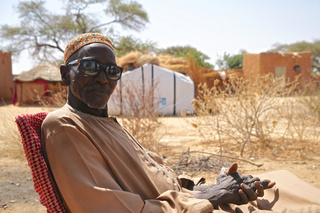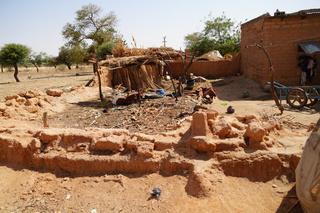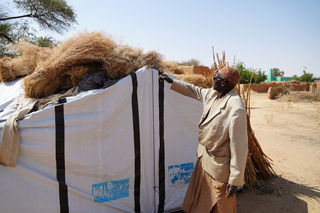Ali Naino, 76, is the head of a family of seven and lives in the village of Guidan Roumdji in Niger’s Maradi region. When the rainy season hit his village with unprecedented force in June 2021, he lost his house and almost all of his annual harvest. HI provided him with an emergency shelter and some basic household items to see him through.
Climate change is a serious concern for Niger’s population
 The drought in 2021 was the worst Niger had seen for ten years. It was followed by torrential rain that, during several months, pounded the arid ground, drowning and devastating crops and causing irreparable losses to the population. Vital food crops were destroyed and entire hectares of agricultural land ruined.
The drought in 2021 was the worst Niger had seen for ten years. It was followed by torrential rain that, during several months, pounded the arid ground, drowning and devastating crops and causing irreparable losses to the population. Vital food crops were destroyed and entire hectares of agricultural land ruined.
"Our village will never forget the rainy season in 2021. Violent hailstorms caused extensive damage. It was almost harvest time when it happened. It was terrible. We lost almost everything. Our crops were virtually destroyed. We still can't believe it: we’d never experienced anything like it before," explained Ali Naino.
Theses particularly violent events in 2021 were doubtless due in part to climate change, which has a major impact on the intensity and frequency of these increasingly frequent climatic phenomena in Niger.
"The issue of climate change and the disruption of the seasons is our biggest worry. The years come and go and we see irregularities from one season to the next. Hailstorms are not usual, but the very fact that we’ve had them in the past makes us worry that they’ll happen again. And the quality of our harvests is also affected by it. Some people have even had to sell their land to buy food. The soil has been leached and we don't have the means to enrich it with chemical fertiliser.”
Homes destroyed by the hail
 Crop damage is not the only consequence of these violent weather events; people’s homes are also destroyed. Ali lived with his family in a house made of banco, a traditional building material made of sand and water. When the hail hit, the walls of his house caved in, nearly burying the inhabitants and their belongings.
Crop damage is not the only consequence of these violent weather events; people’s homes are also destroyed. Ali lived with his family in a house made of banco, a traditional building material made of sand and water. When the hail hit, the walls of his house caved in, nearly burying the inhabitants and their belongings.
"The hailstones perforated all the sheet metal roofs in the village. We had a house made of banco. When the hail started, everything fell apart - the walls collapsed," recalls Ali.
To support Ali and his family, HI provided them with an emergency shelter - a tent made of strong iron frames and waterproof canvas – as well as a kit of household items, including cooking utensils and cooking pots.
"This support has been very useful to us: your shelters brought us comfort. They seem safer than our banco houses. We are less cramped now and I can even invite guests to my house. Also, thanks to the cooking utensils, we no longer have to worry about borrowing pots from the neighbours. We feel better about ourselves, because it’s not easy for a head of household to know that, even to cook for his family, he has to borrow from someone else," says Ali.
Adapting to cope
 Today, Ali and his family have their lives back on track and the hailstorm is behind them. Despite the difficulties they face, they are still cultivating their land, growing millet, sorghum, maize and beans.
Today, Ali and his family have their lives back on track and the hailstorm is behind them. Despite the difficulties they face, they are still cultivating their land, growing millet, sorghum, maize and beans.
"Agriculture is crucial for us because it’s the only means we have to meet our needs. But I’m also planning to diversify my activity and start a small business. We’ve realised that unfortunately our annual crop production doesn’t cover all of our needs, especially during the period just before the harvest. We must find other things to supplement agricultural activities," says Ali.
The support provided to Ali Naino is part of an emergency response project designed to help meet the needs of vulnerable populations in Niger’s Maradi region. The project supports nearly 1,000 households affected by conflict or disaster by distributing emergency shelters and household kits. It also identifies, trains and supports 10 people from the community to act as a link between HI and the villagers. This project is implemented with OCHA funding.
GREEN project: HI is committed to reducing the adverse effects of climate change on the world's vulnerable and marginalised populations. Our organisation prepares communities to cope with climate shocks and stresses and responds to crises amplified by environmental factors. HI takes vulnerability or exclusion factors related to disability, gender and age into account in all its actions, and lobbies for practitioners and politicians to also integrate this approach into their climate work. HI is also committed to reducing its own carbon footprint by adapting and implementing environmentally friendly approaches to its humanitarian action.


 The drought in 2021 was the worst Niger had seen for ten years. It was followed by torrential rain that, during several months, pounded the arid ground, drowning and devastating crops and causing irreparable losses to the population. Vital food crops were destroyed and entire hectares of agricultural land ruined.
The drought in 2021 was the worst Niger had seen for ten years. It was followed by torrential rain that, during several months, pounded the arid ground, drowning and devastating crops and causing irreparable losses to the population. Vital food crops were destroyed and entire hectares of agricultural land ruined. Crop damage is not the only consequence of these violent weather events; people’s homes are also destroyed. Ali lived with his family in a house made of banco, a traditional building material made of sand and water. When the hail hit, the walls of his house caved in, nearly burying the inhabitants and their belongings.
Crop damage is not the only consequence of these violent weather events; people’s homes are also destroyed. Ali lived with his family in a house made of banco, a traditional building material made of sand and water. When the hail hit, the walls of his house caved in, nearly burying the inhabitants and their belongings. Today, Ali and his family have their lives back on track and the hailstorm is behind them. Despite the difficulties they face, they are still cultivating their land, growing millet, sorghum, maize and beans.
Today, Ali and his family have their lives back on track and the hailstorm is behind them. Despite the difficulties they face, they are still cultivating their land, growing millet, sorghum, maize and beans.


